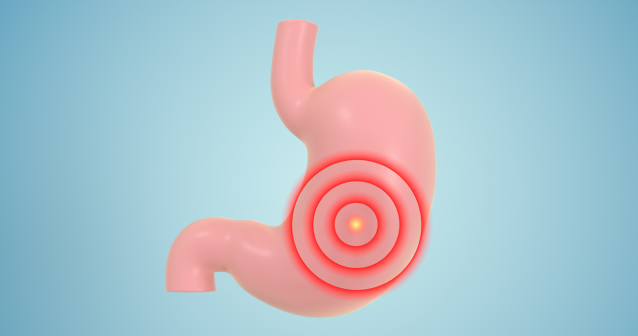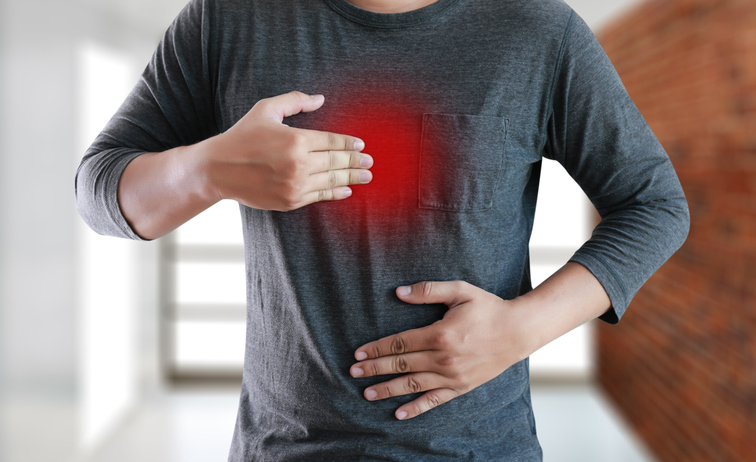What is indigestion?
Indigestion is pain or discomfort you feel in the upper part of your tummy (abdomen), which usually comes on soon after eating or drinking something that doesn’t agree with you. You may also get other symptoms like a burning feeling in your chest – known as heartburn – or feeling sick (nausea).
There are lots of other reasons why you can get this common condition including certain medications, medical conditions and long-term stress.
The good news is that for most people, indigestion (which goes by the medical name dyspepsia) only happens from time to time, is mild and can be easily treated at home. But sometimes, it can become quite uncomfortable and frustrating if you get it regularly, without knowing why.
Here’s what you need to know about indigestion, what causes it, and how to deal with it.
What are the symptoms of indigestion?
The main symptom you tend to get with indigestion is pain or discomfort in the upper part of your tummy, but you may also get these symptoms:
- feeling bloated and uncomfortably full
- nausea
- heartburn – this is caused by acid reflux (when stomach acid travels upwards from your tummy to your throat)
- burping (belching) and farting (flatulence)
- having a bitter taste in your mouth
- being sick (vomiting)
How fast do symptoms come on?
You’ll usually get these symptoms soon after eating or drinking, but sometimes you may only get them later as your food digests. How long you take to get symptoms depends on the cause of your indigestion – for example, if you’re taking antibiotics it may take longer to get symptoms than if you’ve been eating spicy food too fast with a fizzy beer to wash it down.
How long does indigestion last?
How long indigestion lasts also depends on what’s causing it. It may last for a few minutes to an hour or 2 before going away on its own. If you have an underlying medical condition causing it, it may last for weeks or a lot longer – you may find that you constantly have indigestion or that it happens regularly over weeks. Read more about how long indigestion lasts.
What’s the difference between indigestion, heartburn and reflux?
Acid reflux is when acid leaks up from your tummy into your throat. This will often cause that burning feeling in your chest known as heartburn. Indigestion is a more general term used to describe a wide range of digestive issues with different symptoms, which includes the symptom of heartburn.
What causes indigestion?
Indigestion can have lots of possible causes, but it’s not usually anything serious and you’ll be able to treat it easily and effectively. Common causes are thought to be related to:
- stomach acid. Your tummy naturally produces acid to break down and digest food, but sometimes this acid can irritate your tummy lining, the top part of your bowel (duodenum) and your food pipe (oesophagus) causing indigestion and other symptoms. Indigestion can also happen because your tummy lining is very sensitive to this acid
- your stomach. If your tummy is over full and gets ‘stretched’ when you eat it can cause indigestion, too. It can also be because food stays in your stomach longer called ‘delayed gastric emptying’. Sometimes you can also have a bacteria called H.pylori on the lining of your stomach and gut and this can also give you indigestion symptoms
Other things that can trigger or make indigestion worse include:
Food and drink
This could be down to:
- eating too fast or too much
- eating spicy, greasy, fatty or acidic foods (like tomatoes or oranges)
- drinking too much caffeine, alcohol or fizzy drinks
Read more about foods that cause heartburn.

Obesity
Being obese can cause indigestion, in some cases. If you’re overweight, it can lead to excess belly fat increasing pressure on your tummy, causing stomach acid to move upwards. It can even lead to conditions like a hiatus hernia, that make you more likely to get acid reflux and indigestion.
Smoking
Smoking increases your risk of heartburn and stomach ulcers (which can cause indigestion). When you smoke nicotine, it relaxes the valve that keeps stomach acid out of your food pipe and allows this acid to leak up into your food pipe, causing heartburn.
Smoking can also make heartburn and stomach ulcers more difficult to treat.
Stress or anxiety
If you regularly feel stressed or anxious, it can affect your digestive system, causing symptoms of indigestion. This is because part of your ‘fight or flight’ response to stress changes how well your gut functions, affecting how you digest your food. Read more about the effects of stress on the body.
Pregnancy
Getting indigestion when you’re pregnant is common, especially from 27 weeks onwards. The hormonal changes and growing baby can affect how well your gut works. As the muscles are more relaxed between your stomach and food pipe, more stomach acid can travel up into your food pipe causing symptoms like heartburn and indigestion. As your baby and uterus grows bigger, it will also put more pressure on your tummy, which can make symptoms worse.
Certain medicines
Certain types of medication can cause indigestion, including:
- non-steroidal anti-inflammatory drugs (NSAIDS) – NSAIDs, like ibuprofen, affect the production of chemicals called prostaglandins that look after your tummy's protective barriers. NSAIDs affect the protective lining of your tummy so it's not as well shielded from stomach acid. This, in turn, leads to symptoms like indigestion and heartburn. In severe cases, NSAIDs can even cause small ulcers as the lining gets more inflamed
- nitrates – these help widen your blood vessels, but they can also cause acid reflux and indigestion
- certain antibiotics – these medicines get rid of harmful bacteria causing an infection, but they also kill ‘good’ bacteria that keep your digestive health in balance. This leads to digestive issues like tummy cramps, farting and diarrhoea. Read more about how probiotics may help relieve digestive problems caused by antibiotics
Health conditions
Indigestion can be caused by a wide range of underlying medical problems or conditions that affect your digestive system, including:
- gastro-oesophageal reflux disease (GORD)
- Helicobacter pylori (H.pylori) infection – a common bacterial infection that affects your tummy and may cause indigestion, stomach ulcers and in rare cases, stomach cancer
- hiatus hernia
- stomach ulcers (gastric or peptic ulcers)
- stomach cancer – ongoing indigestion can be a sign of stomach cancer but this is rare. This happens when acid comes into contact with your stomach wall, after its protective lining is broken down by cancer cells. You may have other symptoms like trouble swallowing, feeling tired and losing weight without meaning to
There are also other conditions that have the same symptoms as indigestion. For example, both irritable bowel syndrome (IBS) and lactose intolerance have symptoms of indigestion like stomach pain and bloating, and can be triggered by food and drink. And in the case of Crohn’s disease, it can also cause symptoms of indigestion as well as stomach ulcers.

When to see a doctor
You can usually treat your symptoms with self-care measures, but if your symptoms are upsetting your day-to-day life, including your sleep, then see a doctor as soon as possible.
You should see a doctor as an emergency if you:
- are in a lot of pain
- have a fever
- have a lot of blood in your poo or you’re vomiting blood
- notice your poo is black (like tar)
- develop severe chest pain or chest pain that’s worse when you exert yourself, that spreads to your left arm or jaw, or you’re also sweating or short of breath
You should also see a doctor as soon as possible if you:
- have indigestion and other symptoms that keep coming back (this could be either daily or a few times a week) even after trying self-care measures for 2 weeks or more
- are 55 or above
- have trouble swallowing
- keep being sick (vomiting)
- have lost a lot of weight without meaning to
- can feel a lump in your tummy
- notice a small amount of blood in your poo
It’s rare but sometimes, your symptoms could be a sign of a more serious underlying condition like a stomach ulcer (medically known as peptic or gastric ulcers) or stomach cancer, so it’s important to get them checked out.
If you’re worried about your symptoms, try our Smart Symptom Checker.
Diagnosis
For most people, indigestion can be easily treated at home or by asking a pharmacist for the most suitable medicines to relieve your symptoms.
If you need to see a doctor, they will ask about your symptoms, your lifestyle, any health conditions you may have and any medication you’re taking.
They may also run some tests to find the cause of your indigestion, such as:
- an endoscopy to examine your digestive system
- an ultrasound scan to check the inside of your tummy
- a stool test – a small sample of your poo is tested for H.pylori bacteria and may also be used to exclude other conditions such as inflammatory bowel disease
- a urea breath test – this checks if you have an H.pylori infection. You’ll have to drink a liquid containing urea (a chemical broken down by this bacteria) and then your breath will be checked for the bacteria
- a blood test – this is sometimes used to check if you’ve had an H.pylori infection but other tests might be suggested to rule out other conditions which may cause similar symptoms such as coeliac disease
Treatment
The treatment for your indigestion depends on its cause. You may find simple lifestyle changes and remedies from the pharmacy do the trick, or you might need additional guidance from a doctor.
Self-care for indigestion
First try these diet and lifestyle changes to manage your indigestion
Adjust what and when you eat
- avoid spicy, rich, acidic or fatty foods. Read more about how to get rid of heartburn and foods that help with heartburn
- don’t eat 3 to 4 hours before bedtime – your digestive system needs time to digest a meal properly before bedtime. If it doesn’t get at least a few hours to do its job, you may find that stomach acid moves into your food pipe while you’re lying down and causes indigestion. Try also propping yourself up with pillows while you sleep to prevent indigestion
- cut down on caffeine, alcohol and fizzy drinks
- consider a natural remedy such as camomile tea, ginger or probiotics, but do it safely. Read more about home remedies for indigestion and how probiotics can help you
- eat healthily generally and don’t eat too much, as you’re more prone to get indigestion if you’re very full
Deal with underlying causes
- manage your stress and anxiety levels. Read more about how to relieve stress and when to see a doctor about stress
- if you’re pregnant, you may feel like you need to eat extra, but you don’t always need to, especially in the first 6 months. Read more about healthy eating during pregnancy
- stop smoking if you smoke – this is especially important if you’re pregnant as it can harm your and your baby’s health
- lose weight if you’re overweight. If you’re very overweight, ask a doctor for guidance on how to lose weight safely
Help from the pharmacy
If you need immediate relief from indigestion, ask a pharmacist for the most suitable medicine for you. Be sure to tell them if you’re pregnant, have any medical conditions or are taking any medication. A pharmacist may suggest:
- taking antacid medicines – these counteract the acid produced in your tummy
- not taking aspirin or ibuprofen – NSAIDS can make indigestion worse, but your pharmacist should be able to help you work out other forms of pain relief
- making changes to any other medicines you’re taking if they’re making your indigestion worse and it’s safe to do so

Doctor-led treatments
If you need to see a doctor about your indigestion, they may recommend:
- self-care measures
- a medication to treat your indigestion – for example, they may recommend proton pump inhibitors (PPIs) to help reduce your stomach acid
- changing your current medication if it seems to be causing your symptoms – don’t stop taking any medication your doctor has advised you to take without discussing it with them first
- treating an underlying health condition
Your health questions answered
Answered by: Healthily’s medical team
What are the complications of indigestion?
Indigestion is common and thought to affect up to 20% of us at one time or another. In up to 80% of people with indigestion no underlying medical problem is found. Sometimes, underlying conditions like GORD can lead to complications, for example:
- oesophageal stricture: Acid reflux is a common cause of indigestion and when this builds up over time in your food pipe, it can scar it. This can cause your food pipe to narrow and is known as an oesophageal stricture. This leads to symptoms like difficulty swallowing, chest pain and food getting stuck in your throat. Surgery is usually needed
- Barrett’s oesophagus: Barrett’s oesophagus (BE) is a condition that happens when repeated bouts of GORD lead to changes in the cells lining the lower part of your food pipe. Around 1 in 10 people with GORD will go on to develop it and will usually only get GORD-related symptoms. In the UK, between 3% and 13% of people with BE will develop oesophageal cancer. The biggest risk factors for BE and oesophageal cancer are GORD, being overweight and smoking
– Answered by: the Healthily medical team







